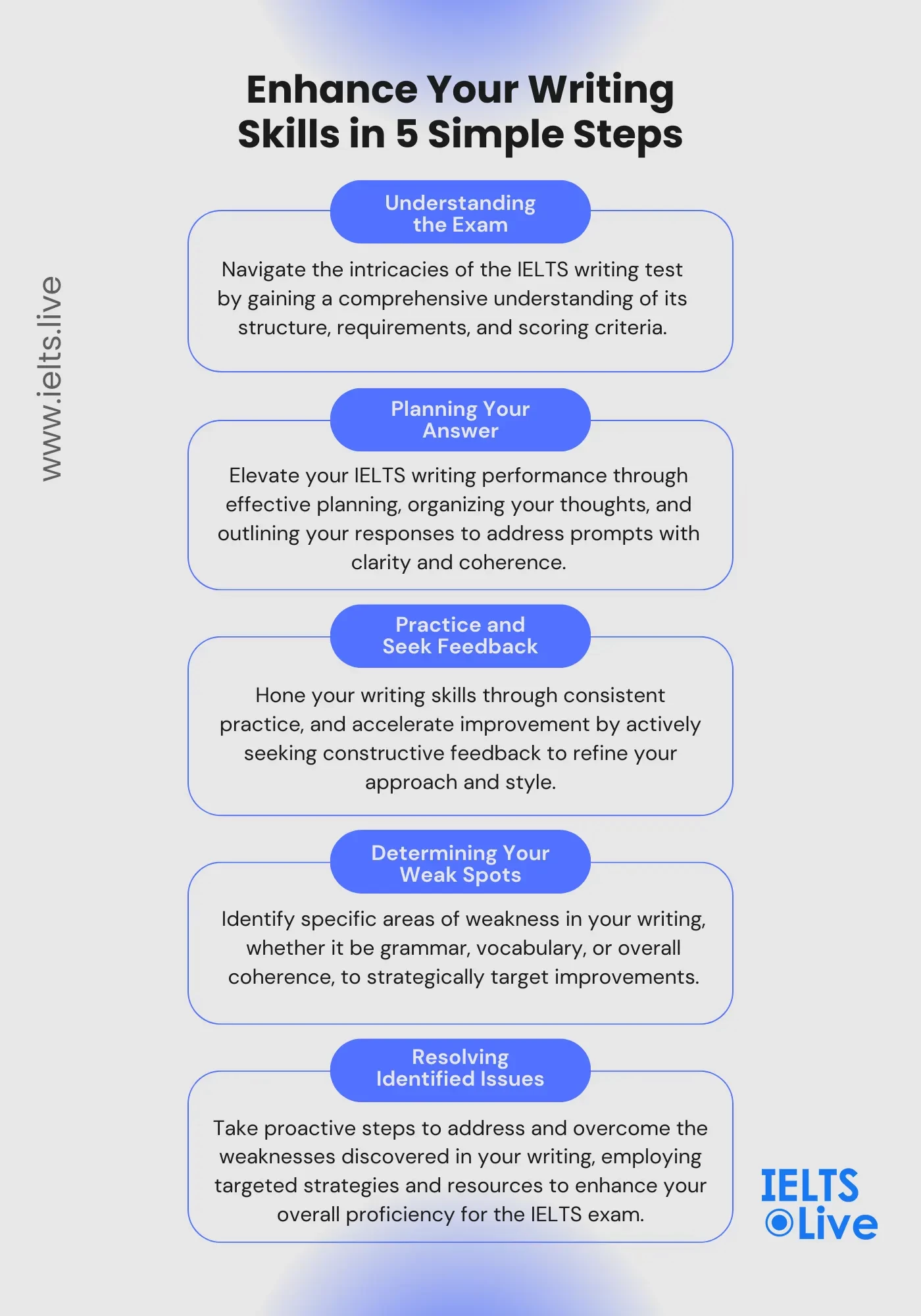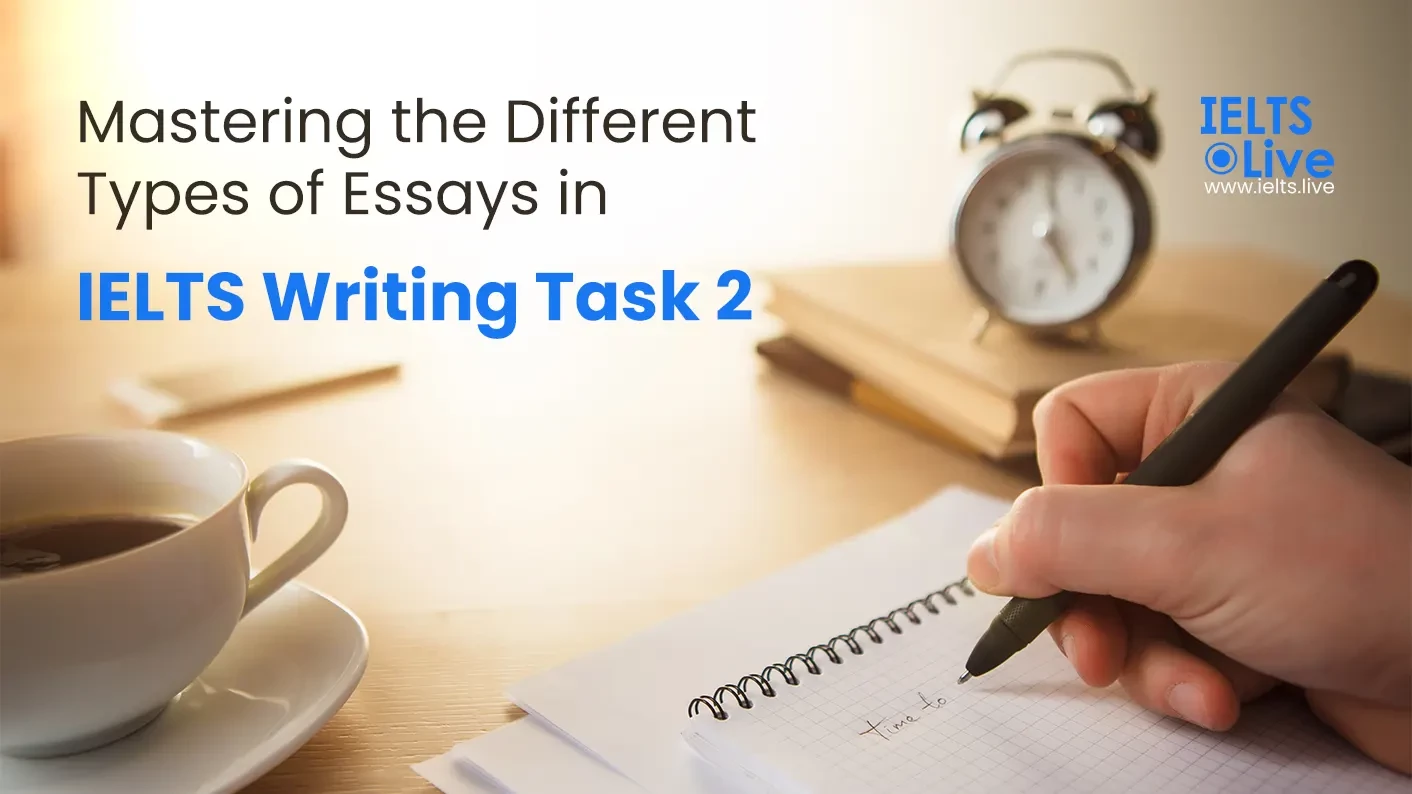
The famous author Ernest Hemingway once said, "There is nothing to writing. All you do is sit down at a typewriter and bleed."
Indeed, writing can be an art form that requires perseverance and a deep understanding of language. And boosting your writing proficiencies can be a challenging task.
In this blog post, we’ll step by step learn how to take on this challenge and grow along the way.
You may also like: 5 Things you Must Do in IELTS writing task 2
When English is your second language, it can take time to acquire a deep understanding of the language which is required for writing. But there are ways to get around it. The IELTS exam already has some fixed structure and marking criteria that you are to follow. Let’s get started with understanding the exam properly and boosting your writing skills.
Understand the exam
Before getting into the writing assignments, the first step is to understand the various types of writing tasks in the IELTS exam. Task 1 and Task 2 are the two tasks. Task 1 asks applicants to interpret and summarize information presented in a visual style, such as charts, graphs, or diagrams. For example, you may be shown a bar graph depicting the percentage of energy consumption from various sources in a specific country. In this situation, your job would be to structurally describe and analyze the data presented.
Task 2 is an essay writing task that evaluates your ability to construct arguments, explore a point of view, or present a problem and propose solutions. For example, you may be asked to analyze the benefits and drawbacks of technology in modern society or to propose solutions to urban traffic congestion. To properly analyze the task prompts, carefully read the directions and determine the important needs, such as the format, word count, and specific points to address. This will help you focus your writing and keep it on track.
Plan your answer
Writing a well-structured essay requires careful thought and organization. So, the second step is to spend some time coming up with topics and creating an outline for your essay before you begin writing. This will assist you in developing a logical flow, identifying essential arguments or points, and crystallizing your ideas.
Imagine you receive a Task 2 prompt asking you to talk about the benefits and drawbacks of technology in contemporary culture. Spend some time considering the potential benefits and drawbacks of technology before starting to write. This can help you in coming up with ideas and guarantee that your essay covers a variety of topics.
Make an outline for your essay once you've done some brainstorming. Your essay should be broken up into an introduction, a body, and a conclusion. Start by providing a compelling opening that states your major viewpoint or thesis statement. To grab the reader's attention, you may open your essay with a provocative question or a surprising statistic.
Then, create your body paragraphs, each of which should focus on a distinct topic or argument, and then include relevant examples or evidence to back up your points. For instance, if you are talking about the benefits of technology, you can give examples of how it has boosted productivity, increased access to information, or improved communication. Finally, wrap up your essay by restating your position or opinion and summarizing your important points.
Practice and seek feedback
The third step is to practice consistently. Set aside time specifically for writing essays on various topics within the allotted time frame. This will not only make it easier for you to become used to the exam format, but it will also help you improve the coherence and pace of your writing.
Look for practice materials or sample essay questions from dependable sources, such as authorized IELTS study guides or trusted websites. Examples of websites with sample essay questions and writing advice include those from the British Council and Cambridge English. You can also use our $1 writing feedback service on our website.
Receiving feedback on your writing and sharing it with others can provide you with constructive criticism and point out areas where your writing needs work. Evaluate the criticisms that were made and focus on the areas that need improvement. Consider employing transitional words and phrases to enhance the flow and logical progression of your ideas, for instance, if several reviewers point out that your essay lacks consistency.

Determine your weak spots
This I believe is a major step in improving your writing. If you can detect your weak spots accurately then you have half the job done. There are several reasons to find out your weak spots. Such as,
- Targeted Improvement: Identifying your weak spots allows you to focus your efforts on specific areas that need improvement. Rather than spending equal time on all aspects of writing, you can prioritize the areas that require the most attention.
- Personalized Learning: Every writer has unique writing strengths and weaknesses. You can modify your learning and practice to focus on your weak areas by identifying them.
- Building Self-Confidence: Your self-confidence as a writer will increase if you identify your areas of weakness and actively attempt to improve them. As you make progress and see improvements in your writing, you gain a sense of accomplishment and belief in your abilities.
Resolve the issues you found
Now that you’ve found what problems you have, it is time to resolve them. Remember that we need to move step by step. One thing at a time so that it doesn’t get overwhelming. In this section, we will be talking about some common issues and how we can get rid of them.
Grammar and Sentence Structure
Poor grammar and inconsistent sentence construction can make your writing difficult to understand. Consider the following tactics to enhance your performance in this area:
- Practice grammar by working on the particular grammatical rules you find difficult. There are several websites and publications about grammar that include practice materials along with explanations. You can literally find them for free online.
- Grammar Guides and References: To better comprehend grammar rules, consult reputable grammar guides and references. You can more successfully apply the rules in your writing if you understand them. You can also check our blogs on grammar.
- Editing and Proofreading: Make it a habit to edit and proofread your work. Pay close attention to grammatical mistakes and weak sentence constructions.
Limited Vocabulary and Word Choice
Having a limited vocabulary can make it difficult for you to express yourself clearly and precisely. Try the following strategies to increase your vocabulary and word choice:
- Reading: Read widely and on a variety of subjects and genres. You will learn new words and get an understanding of their usage and context if you are exposed to a variety of literature.
- Word Lists and Flashcards: Make word lists based on themes or topics that are specific to your writing objectives. Use flashcards to routinely review and reinforce the definitions and use of these words.
- Synonyms and Collocations: To minimize repetition and improve your writing, learn synonyms for frequent words. Learn how to employ collocations, which are word combinations that are commonly used together, to help your sentences flow more naturally.
Cohesion and Organization
Your write-up may be tough to follow if it lacks cohesion. Use the following tactics to improve coherence and organization:
- Outlining: Before you start writing, make a concise outline that groups your primary points and arguments for each of them. This will guarantee a logical progression in the structure of your essay.
- Transitional Words and Phrases: Use transitional words and phrases to link concepts and let sentences and paragraphs run naturally. However, "moreover," "in conclusion," and similar words and phrases help your writing flow better.
- Paragraph Structure: Pay close attention to how your paragraphs are organized. Each paragraph needs a clear main sentence, two or three sentences that support it, and a sentence that sums it all up. This structure keeps your ideas coherent and efficiently delivers them.
Time Management
Spend a few minutes before you begin writing your essay organizing and structuring it. This will speed up the writing process and assist with idea organization.
- Practice Timed Writing: Practice timed writing by establishing a time limit for your practice sessions. Your ability to write within the allotted time and efficiently manage your time will improve if you practice in exam-like circumstances.
- Planning and Outlining: Before you begin writing your essay, spend a few minutes planning and outlining it. You'll be able to better organize your ideas and cut down on writing time as a result.
- Monitoring Progress: Keep an eye on how much time you devote to each part of the writing assignment. This will help you plan your time effectively and guarantee that you have enough time to proofread and revise your work.
That is all we have for this blog. Hope this helped you to find out your lackings, fix them and boost your writing skills. For more educational content like this, you can visit our Facebook page and subscribe to our YouTube channel.
Good luck with your IELTS exam!










0 COMMENTS